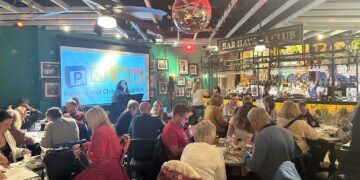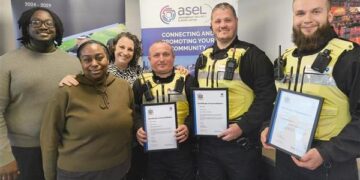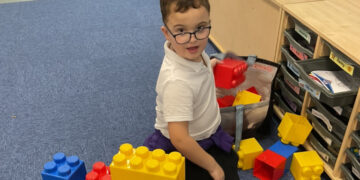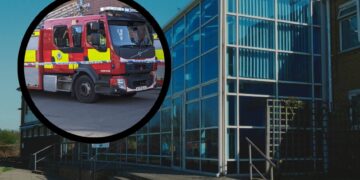INDIVIDUALS and communities have pooled together in recent months to tackle the common enemy that is the cost of living crisis.
Despite being pushed to their physical and emotional limits, trying circumstances have brought the best out of people who have had to help themselves and others in ways they probably would not have envisaged before.
A particularly vulnerable demographic is single parents, many of whom are negotiating post-pandemic challenges while also raising their children alone.
The Whitley Community Development Association (WCDA) and Home-Start are two of many charities which alleviate pressure off those in such circumstances.
Emily, who now works at the WCDA as part of the Whitley Researchers team, has been a single mother since the birth of her eldest six years ago.
She said: “It’s been a rollercoaster of ups and downs trying to figure out how to better my life and my children’s lives so they are not doing the same things I’m doing now figuring out how you’re getting to the next pay packet.”
Taking up the job led to a £156 increase in her council tax which has meant there has not been a marked impact on her disposable income.
“All my bills have now gone back up because I’m working even though I’m only earning an extra £400 per month,” she explained.
“Even when it comes to my internet, I was on a special tariff because I wasn’t working. Now I am, I can’t have that tariff. My council tax has gone up from £31 to £187, it’s a big jump.”
With her gas and electricity bills almost doubling, the family is not left with much, if any, extra money once all bills have been paid. This has not deterred Emily from working, for her own self-development, but also to set an example for her children.
She said: “I don’t want the kids to think that because working is hard you shouldn’t do it. I want them to know that you keep working hard until it does change,”
“Hopefully the situation will have changed by the time my kids get older, they want to have their own kids and won’t have the same worries.”
Emily’s daily routine features school runs, work, helping with homework, baths, cooking meals and getting her children to bed. She admits that it doesn’t leave much time for her to kick back and watch a movie or read a book.
She said: “By the time I’ve got them in bed and read a night-time story, I’ve got to put the entire house back together which can take anywhere from an hour to an hour and a half. After that, I’m done, I just need to go to bed. I’m up again at six to start all over again. This is why it frustrates me when they say that people from an area of deprivation must be lazy.”
“You’re either lazy or you just don’t want to know things, neither of these things are true. Not for me and I know a lot of single parents feel the same way. A lot of the people I’m surrounded by are very intelligent and could go very far but they just don’t have the access to what they need.
“They’re worrying more about their kids, putting themselves on the backburner for a while, I certainly did. But you need to remember that you’re human too. I need to be alright too. Working has been great for my mental health, to get out of the house.”
Trisha Bennett, the WCDA’s community development coordinator, believes that mutual trust between the organisation and its users has been key to its success.
She said: “The practical advice and the food surplus gives people a way in and helps us build a relationship with them. It builds trust and they start to tell us more about what’s going on in their lives and some of the other issues they’re facing. That way, we can introduce them to CommuniCare, NHS’s MEET PEET team and other organisations we work with.
Ms Bennett believes the WCDA’s provision is about more than just practical support, and it’s clear to see in the strides Emily has made in her role.
“We then build the relationships in other ways. In Emily’s case, we gave her opportunities in terms of employment and it really is life-changing, literally life-changing. There have been others as well.
“It’s not always about financial stuff, for other members of staff it’s about seeing an improvement in their mental and physical health, them feeling like they belong and other bits and pieces like that. It’s a sense of belonging and being part of something, having access to information.
“It’s also visible in their kids as well. They’re brought up in surroundings where they’re back to feeling like they belong and where they’re a part of, not apart from. I think that’s really important.”
Home-Start is a UK-wide charity which helps young families through non-judgemental emotional and practical guidance. It has separate Reading and Wokingham divisions.
One of its users, whose name has been changed to Susan, is all too familiar with the trevails of being a single parent and recently won custody of her three children after lengthy court proceedings.
The process took its toll on Susan, who has various mental health issues caused by being in an abusive relationship.
Her eldest, who is six-years-old, has special educational needs for which she is being assessed.
Susan explained: “The most difficult challenges are doing everything all by yourself, time management is all on you and you have to be the one setting a routine. Disciplining the kids is something I’m still learning, I don’t know what I’m doing all the time.
“The bottom line is that I wasn’t receiving enough support. The dad is not a great role model for the children. I constantly have money worries.”
She added that the cost of living crisis and associated increases in bills have had a significant impact on her family, having to borrow money each month to make ends meet. On one occasion, she lost electricity during the day because she couldn’t afford it.
Turning to Home-Start has alleviated some of the practical and mental pressures she would otherwise have had to combat alone.
A volunteer initially visited Susan and her family at their house when she became known to the charity in 2019, but such has been her progress she has since started attending group sessions instead.
Susan credited the group’s organiser, Mandy, who she described as ‘an amazing leader’ and someone who’s helped her become a stronger person.
As well as the practical support and signposting offered at the weekly sessions, attending them allows Susan to save on electricity for a few hours a week, which has helped reduce monthly outgoings.
Interacting on the meetings’ WhatsApp group has provided additional support. She said: “It gives me real mental support as other mums are there to share information whenever they come across a deal, offers or free tickets to something.
“We just let each other know. It’s a wonderful network of support.”
There are a wide range of charities and community projects in Reading which are helping those who are looking for support of all nature.
CommuniCare offers support, information and advice to ease financial hardship. It assists with benefits claims, housing, employment and appealing unjust decisions. For more information, visit: www.communicare.org.uk
Those in need of essential goods such as furniture, bedding, kitchen items and white goods can reach out to Christian Community Action. Its furniture store at 79 Northumberland Avenue and drop-in support centre at Caversham Baptist Church provides essential items at a fraction of their retail price.
CCA also has four shops at Oxford Road, Sonning Common, Southcote and Whitley where you can pick up good quality bric-a-brac. Reading Today visited the Whitley branch in October. For more information, visit: www.ccam.org.uk
Young adults looking for employment and self-development opportunities can reach out to Starting Point, who mentor those aged up to 25 and help with CV writing and interview preparation. For more information, visit: www.startingpoint.org.uk
Having initially been established to help housebound residents during the pandemic, Torch provides practical help and emotional support to those who feel like they have nowhere to turn. For more information, visit: www.torchhub.org.uk
Citizens Advice Reading can be found at: www.rcab.org.uk























